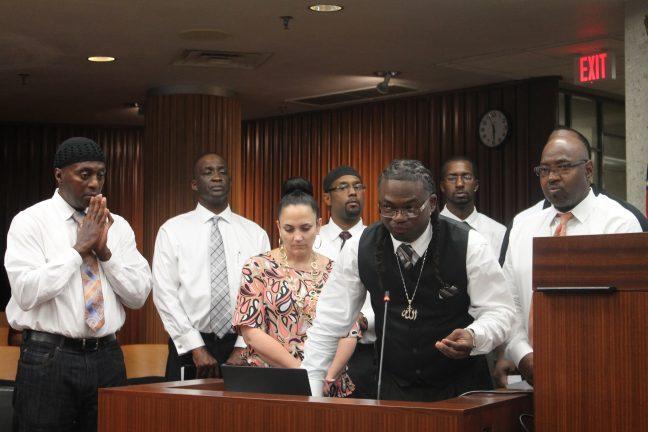“When does the suffering stop?”
Community leader Minister Caliph Muab’El asked City Council members and officials this question Tuesday evening when he and a group colleagues presented their 15-point plan aimed at reducing racial disparities, violence and recidivism in Madison.
To address the growing gun violence and threats to safety in the community, a group of grassroots organizers, community members and leaders of color joined together to form the Focused Interruption Coalition. The coalition combined their efforts with previously proposed plans from Alders Maurice Cheeks, District 10, and Matt Phair, District 20, as a response to the rising violence within the city.
Madison community continues to seek change on one-year anniversary of Tony Robinson’s death
The coalition is currently looking to the city to provide them with $3 million over the next three years to fund the initiatives detailed in the 15-point plan.
Ultimately, the goal of the three-year plan is to create an independent civilian division working in conjunction with Madison Police Department by 2018. The office, officially named the Madison Alternative Policing Strategy, will work with the police, business and philanthropic community to develop violence prevention strategies in the city.
One of the architects of the plan, Zandra Hagberg, said she understood the process to develop the strategy group will take time.
In the meantime, to keep at-risk youth and other members of the community safe, the Focused Interruption Coalition decided to prioritize the first three initiatives and implement them in the first year of the project.
The first two initiatives focus on providing low income persons between the ages of 18 to 35 with peer support coaches and a peer support hotline. The estimated cost for the initiative is $240,000.
“You are looking at a group of people who received peer coaches, and as a result of this peer support, we are leaders in the community,” Hagberg said.
County chess club provides positive role models, diversions for adolescents
Frank Davis, another member of the coalition and architect of the plan, asked Madison’s Community Development Division to consider mentoring as a “priority funding area.”
In the second year of the plan, the recommendations focus on alternative sentencing for first-time offenders and removing offenses from the Wisconsin Court System Circuit Court Access.
“We should not be thinking about how to ruin people’s lives,” Maub’El said. “We should thinking about providing opportunities to allow members of the community to move past their mistakes.”
The State of Wisconsin pays an estimated $30,000 per inmate. Ald. Steve King, District 7, voiced his support for the plan, commenting that Wisconsin’s judicial system is more willing to jail a first-time offender, but not willing to spend a fraction of that for initiatives like the coalition has proposed.
In funding the plan, the coalition is primarily looking to the city to provide $3 million over the next three years with an estimated $1 million each year afterward to sustain its efforts.
No new projects: Soglin slashes budget requests for 2017 capital budget
While the long term survival of the plan relies on city funding, Hagberg said it is not entirely the city’s responsibility. Instead, the coalition looks for collaboration between various agencies to fund the initiatives.
Approximately $700,000 in funding for the plan will be considered as part of Soglin’s 2017 capital budget.
“If we touch one part of the body and harm it, the whole body suffers as result of the infliction of that pain,” Muab’El said. “The community functions as a body, and right now, it is sick. We look at the 15-point plan as an antidote for it.”















